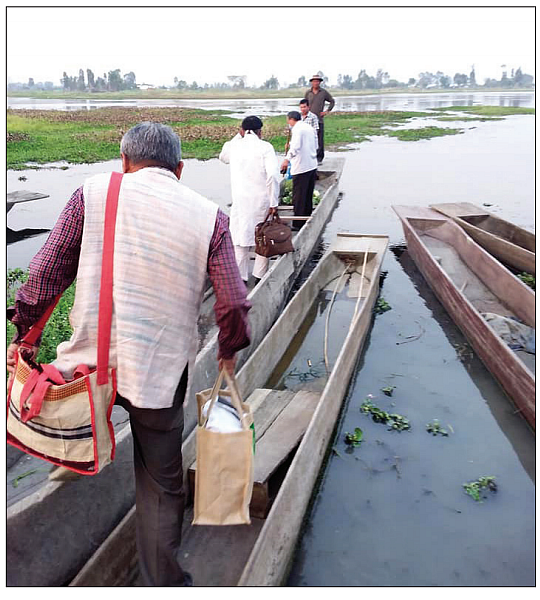The ‘lake’ sharks of Manipur all set to swallow Loktak, the largest freshwater lake in the NE
Loktak lake stretching up to 35 kilometres in length is being handed over to the hospitality industry. But fishermen wonder why they need to be evicted to make way for a few hundred seasonal tourists

Loktak Development Authority, a state-run agency, burnt down over 700 huts built over floating biomass on the 350 square kilometre Loktak lake a decade ago. The over 3,000 fishermen families who were displaced have been resisting their eviction by the state which wants to convert this fragile ecosystem into a commercial and tourist hub.
The BJP government of Manipur has already handed over an island to a private hotel chain, where a water sports complex has been set up. In the process, the government and the private operator have cleared the biomass from the lake which contained rich medicinal herbs and plants, the roots of which were the breeding ground of 15 species of fish.
In the area where over 1000 fisherfolks are still residing, resisting eviction, floating islands of biomass still exist, defying the onslaught of commercial vested interests represented by tour operators and hoteliers.
Loktak is surrounded by five districts of Manipur and is the recipient of water from Iravady and other rivers that originate from the hills that stretch from Nagaland to Myanmar.
I spent a night in one of the floating huts of Rajen Singh Oinam, a former BSF jawan, who is the secretary of the All Loktak Fishermen’s Union. It took us a one-hour ride in a narrow canoe dug out of a log to reach his hut from the mainland.
The hut rests on bamboo pillars planted in the lake and has floors made of wooden planks and corrugated tin sheet roof. The hut is lit by solar lamps.
It was well after sunset that we reached Rajen’s hut. There were already over 30 fishermen and women seated in the hut in a circle. They had come by canoes from different floating islands.
In 2011, over a thousand indigenous fishing folk – Meiteis, were evicted when more than 700 floating huts or Khangpokshang, built over Phumdis (floating plant mass on Loktak Lake) were burnt down by the Loktak Development Authority (LDA). The floating huts were burnt down under the provisions of the ill-conceived Loktak Lake (Protection) Act, 2006, that prohibited dwellings on the phumdis and the dwellers were termed as illegal occupiers.
However, the Meitei fisherfolks fought all odds to continue living on the floating huts of Loktak, upholding their age-old way of living and fishing in the face of tremendous hardship. Apart from torching their dwellings, fishing gears and nets of the communities, their only means to catch fish from the Loktak wetlands had also been burnt. The displaced fishing families were given shelter under the aegis of ALLAFUM.
A case against the then state government was filed before the Asian Human Rights Commission for violating “right to life”, and “right to adequate housing” as guaranteed by the Constitution of India.
Dwellers of Champu Khangpok village, who stayed in the middle of Loktak Lake, were also deprived of voting rights since the time Manipur became full-fledged state. According to the Census of 2001, the phumdi village has a population of 700-800 and is located under Moirang subdivision of Bishnupur district.
“We now have our names included in the voters’ list and also have ration cards. But the addresses against our names show us as residents of peripheral villages,” said Oinam Rajen Singh. The All Loktak Fishermen’s Union of Manipur in collaboration with People Resources Development Association, an active NGO in the province, has set up the country’s first floating elementary school at Langolsabi Leikai of Champu Khangpok in northern part of the lake. Most of the villagers of Champu Khangpok are uneducated and mostly depend on fishing as meagre source of income. At present the school has 25 students (mostly dropouts) and two teachers.
“My son, after passing his matriculation from a high school, lives with me with his wife and does fishing for living because I could not pay Rs 5 lakh which was sought as bribe to get him a job as a police constable,” recalls Rajen.
Rajen, his wife, son and daughter in-law all live on fishing, earning anything between Rs 12,000 to Rs 15,000 a month.
The fisher folk of Loktak, living there since time immemorial, are now in dire straits because of dwindling fish catch. The construction of a dam for a hydel power plant of National Thermal Power Corporation has obstructed the flow of water from the rivers that originate from the surrounding hills.
After Loktak was declared “a wetland of international importance”, the government began to take steps to clear the lake of human settlements on floating islands, instead of including the fishermen in the conservation process, the local government evicted them from their age-old dwelling.
Why couldn’t tourism development plans be framed in consultation with the fishermen? Since not more than a few hundred seasonal tourists will arrive on any given day, fishermen wonder why they all need to be evicted in the first place.
( The writer is a senior journalist and commentator based in Ahmedabad. Views are personal)
Follow us on: Facebook, Twitter, Google News, Instagram
Join our official telegram channel (@nationalherald) and stay updated with the latest headlines
